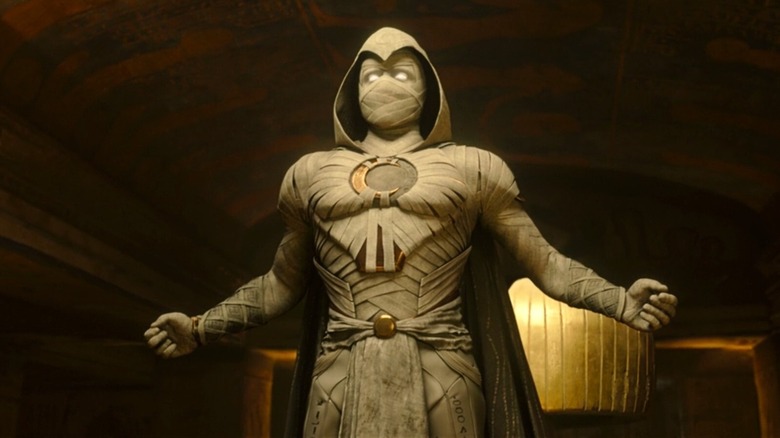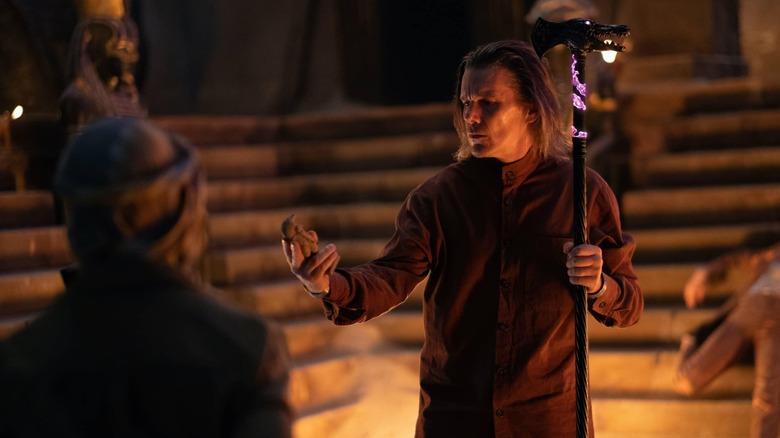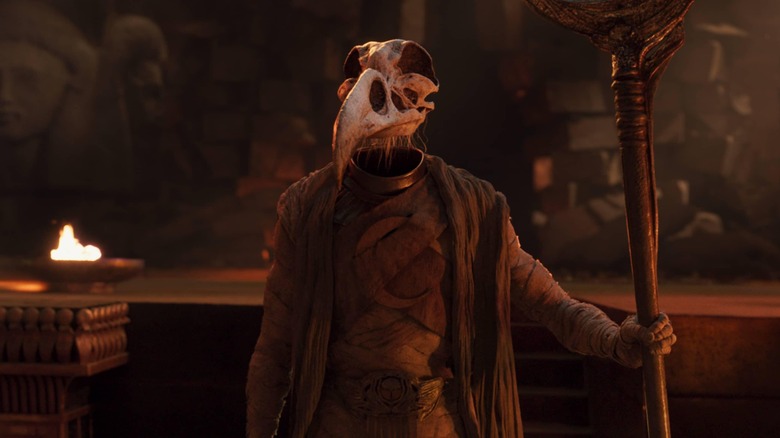Moon Knight Season 1 Ending Explained: The Only Way Forward Is Together
In the weeks leading up to release, Marvel's "Moon Knight" represented many exciting things for the Marvel Cinematic Universe. Here was yet another lesser-known comic book character ripe for adaptation into live-action and ready to become the next big thing for mainstream audiences — thanks in no small part to its star, Oscar Isaac. It was also a chance to tell a deeply psychological story delving into very real-world mental health issues (though not 100% accurately). And in an important step forward for making this franchise a little more vibrant and authentic, "Moon Knight" also gave its creative team the opportunity to remain faithful to the source material's depiction of both Judaism and Egyptian culture.
Six episodes later, "Moon Knight" has wrapped up its debut season and, as you'd expect, also left the door open for more adventures down the line. After last week's episode delivered perhaps one of the most thoughtfully introspective and unflinchingly mature hours in all the MCU — largely by neatly skirting the standard superhero origin story problem — the finale returned to a relatively more conventional storytelling mode, for better or worse. Yup, that means big VFX-driven set pieces, more overt superhero vs supervillain fights, and something about the end of the world ... but also some key character-centric choices that helped this new series remain at least somewhat a cut above the rest of Marvel's Disney+ offerings.
Did "Moon Knight" live up to expectations, or end up disappointing you in the end? We're going to dig into all facets of the ending here, so beware of major spoilers from this point on.
'Sometimes we need the cold light of death before we can see reality'
So what's real and what's not? After Marc Spector was shot dead by the villainous Arthur Harrow (Ethan Hawke) a few weeks ago, the subsequent episode took both Marc and Steven Grant on a trippy journey through a psychiatric hospital and the Egyptian afterlife, with the goddess Tawaret guiding them on a quest to balance the scales of their soul(s). Steven ultimately didn't make it to the paradise known as the Field of Reeds, burdened with the knowledge of his origins and choosing to sacrifice himself to ensure Marc's survival. It takes the sixth and final episode over 13 minutes to finally return to Marc, first painstakingly following Harrow as he sets Ammit free from her prison of stone and seeks to unleash the power of prejudgment on countless innocents. When we catch up with Marc, it takes him no time at all to reject an eternity of hard-earned peace and instead go back to save Steven.
This is our first major indication of the finale's predominant theme — that Moon Knight is nothing without both Marc and Steven. As Marc tearfully admits to his counterpart, still frozen in the sands of Duat, "You are the only real superpower I ever had." This revelation proves to be the key to freeing Steven and restoring true balance between the pair of formerly dueling identities. On one level, what's actually "real" doesn't quite matter as much as our hero(es) achieving the hard-fought catharsis of this emotional truth. Remember, Steven was born out of a need to protect Marc from his inescapably harsh reality, so retreating to the fantasy world provided by Steven Grant was a necessary measure in order to cope. What's truly important is that Steven and Marc are together again, working in perfect concert as they return to the land of the living as — finally — a fully-formed and no longer fractured Moon Knight.
Gods and monsters
Upon emerging from the dead in the apt setting of Ammit's tomb, Marc and Steven promptly strike a new deal with the freshly-freed Khonshu: in exchange for this one last service to Khonshu in rebinding Ammit, the spiteful god will finally release them from an eternity of servitude. Thus begins the all-too-familiar climactic battle that Marvel has repeatedly defaulted to over the years, though with the added bonus of Layla El-Faouly (May Calamawy) pledging herself (temporarily!) to Tawaret and joining the fray as Marvel's first Egyptian superhero. And, come on, who among us can deny the geeky glory of seeing a towering Khonshu battling an equally as giant Ammit in the streets of Cairo?
As much of a mixed bag as this choice is on the part of director Mohamed Diab and credited writers Jeremy Slater, Peter Cameron, and Sabir Pirzada (with "Story by" credits from Danielle Iman and Slater, as well), at least it all builds to yet another momentous decision for Marc. Having finally subdued Harrow — though only because of a last-minute assist by a certain third personality — Marc and Layla invoke a spell in order to trap Ammit in the body of Harrow, essentially killing two birds with one stone. Of course, the "killing" part of that equation proves to be a sticking point when Harrow/Ammit are hauled in front of Khonshu to finally face justice ... or is it vengeance? Spurred on by Khonshu to execute them both, preventing all sorts of calamities before they can escape and inflict damage upon the world, Marc finally comes to the realization that Khonshu isn't so different from Ammit, after all.
Having cast aside his Moon Knight persona, we return one last time to that psychiatric hospital — though the bloody footprints left behind by the "therapist" Harrow finally give away the game and allow Marc and Steven to escape this fantasy. Waking up back in his grungy apartment, everything seems to be as it began in the series premiere: sand surrounding his bed, foot tied up to the bedpost, and that cover of the incredibly catchy song "A Man Without Love" playing in the background. The biggest difference, of course, is that now Marc and Steven can peacefully co-exist ... even if springing out of bed and landing flat on the floor again proves that as much as everything's changed, some things don't.


